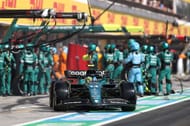F1 is referred to as the pinnacle of motorsport because of the adrenaline it carries, with drivers battling each other at over 200 mph, just to be the first ones to see the chequered flag at the end of the race.
As important as it is for a car and driver to be quick in F1, the teams also have their responsibilities. Making the right choices of strategies for the drivers is one of the most important things that determine where one will finish, and acing this is a big assist in the overall finish.
At the same time, it is also necessary that every pit stop is performed to perfection, in the quickest way possible so that the drivers do not lose a lot of time.

Formula 1 has set world records in making some of the quickest pit stops possible with the help of an excellent crew and perfect coordination. There can be a whopping 22 crew members working on a single car for just a matter of seconds to perform the perfect stop.
Of these 22, 12 work around the tire regions, two on the nose and rear of the car, and one member works to signal the driver.
What are the quickest pit stops in F1 history?
During the early years of the sport, it was common for cars to be stopped for around 20 seconds to perform a complete pit stop. However, in recent times, it has decreased to around 2 to 2.5 seconds. Teams battle each other to make a perfect stop, and even the difference between a 2.1-second stop and a 2.9-second stop can prove to create huge differences in a race.
Red Bull has proven to be one of the most efficient teams when it comes to perfecting their pit stops. The top 6 quickest stops in the history of Formula 1 are all performed by them. Here is when they happened:
- 1.82 seconds - Max Verstappen, Red Bull Racing (Brazilian GP, 2019)
- 1.86 seconds - Max Verstappen, Red Bull Racing (Russian GP, 2020)
- 1.86 seconds - Alex Albon, Red Bull Racing (Portuguese GP, 2020)
- 1.88 seconds - Max Verstappen, Red Bull Racing (German GP, 2019)
- 1.90 seconds - Max Verstappen, Red Bull Racing (Spanish GP, 2020)
- 1.90 seconds - Sergio Perez, Red Bull Racing (Hungarian GP, 2023)
Since the 2022 regulations of F1 saw a change in the configuration of the tires cars (making them larger to 18 inches), the average pit stop time had shifted to 2.2 seconds. However, Red Bull achieved an amazing 1.9 seconds with Sergio Perez during the 2023 Hungarian Grand Prix on Sunday, July 23, making it the fastest pit stop with the new regulations.
